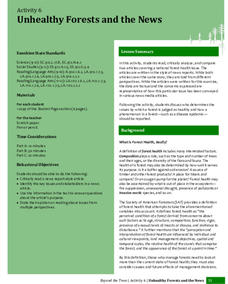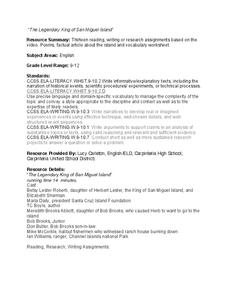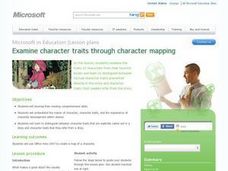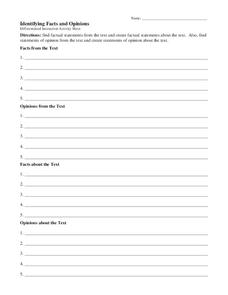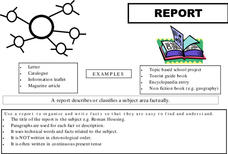University of Florida
Unhealthy Forests and the News
Everyone knows a tree makes a sound when it falls, but what do we know about dying trees? Class members learn background information about Laurel wilt disease from a teacher-led presentation. Team members work with partners to read and...
Curated OER
Learning From World War II and Connecting It to the Present
Compare and contrast World War II to the modern Iraq war with this instructional activity. After watching a film, learners use supporting evidence to support their point of view of the conflicts. Using the internet, they create a...
Curated OER
My Own Backyard
Students explore and react to the painting The Road to Santa Fe. In this interacting with art lesson plan, students locate various objects in the painting. Students copy the angle of objects by using their bodies. Students...
Curated OER
Cartoons for the Classroom: Presidential Candidates
Build critical analysis skills with this cartoon for the classroom. Upper graders answer three critical thinking questions to help them analyze a political cartoon, which depicts how Presidential Candidates are judged and chosen. Put...
Curated OER
Author's Purpose Lesson Plans
Why do we practice identifying the author's purpose? Read this article to gain a better understanding of this reading strategy, and then peruse the attached lesson plans!
Curated OER
St. Patrick's Day Art Projects
Activities to make March 17th more than just a day for the wearing of the green!
Curated OER
Hype!
Eight various activities have your learners looking at hype in the media. Advertisements for films, politics, music, and philanthropy all contribute to emotional appeals and marketing strategies trying to convince consumers to...
Curated OER
News Journalism Across the Media: Introduction
Although students are aware of news as information that influences their perceptions of the world, they are often unaware of the various ways to present that information. Encourage them to investigate, discuss, analyze and make valuable...
Curated OER
Following Instructions
Get scholars thinking about the scientific process with this fun experiment they can do at home. Learners practice reading directions as they underline each instruction in a procedural paragraph. They create a flow chart and record...
Great Schools
Different Types of Writing
What type of writing is this? Learners read a brief introduction to various types of text: instructions, explanations, poems, folk tales, novels, informative, and arguments. The introduction doesn't explain these, so...
National Wildlife Federation
Yesterday: Our Energy Needs Over Time
How has our relationship to energy changed over time? An engaging exploration challenges learners to create a timeline showing human energy needs and uses over time. Scholars review what timelines are, choose a 50-year period in history...
Channel Islands Film
Dark Water: Lesson Plan 3 - Grades 6-12
After watching the documentary Dark Water about a traditional Chumash ceremony and reading a Chumash origin story, viewers are asked to create a coat of arms and to craft an essay that details a family tradition or their own origin story.
Channel Islands Film
The Legendary King of San Miguel: Lesson Plan 3 - Grades 9-12
The documentary, The Legendary King of San Miguel Island, introduces the fascinating tale of Herb Lester, his family, and their life on San Miguel Island. Viewers have an opportunity to expand their study of the island and of...
Curated OER
Fact V. Opinion
Students use statements out of newpapers to distinguish between facts and opinions. They discuss these differences as well.
Curated OER
Vocabulary: Multiple Meaning Words in Context
Learners use context clues to define words with multiple meanings. After extensive practice with their teacher, learners read through six sentences, they then identify a word with a multiple meaning, and determine its meaning based on...
Curated OER
Examining Character Traits through Character Mapping
Some of what we know about a character is directly stated. Some of what we know is inferred by events in the story. Character maps help primary learners recognize the difference. After modeling with a story your class has read, pupils...
Media Smarts
Teaching TV: Learning With Television
As part of a series of resources focused on the influence of television, elementary students watch an educational program and identify the information presented and analyze the point of view from which the information is...
E Reading Worksheets
Identifying Facts and Opinions
Middle schoolers use a guided reading worksheet to demonstrate their ability to identify facts and opinions in a text. In addition, they use the text to create their own statements of fact and opinion.
Curated OER
Non Fiction Posters
A set of very useful posters (in PDF) describing different types of non-fiction texts is here for you. While there isn't an activity, per se, in these worksheets, they could be used as a handy reference for learners who are engaging in...
Curated OER
Desert Views: First Impressions
Students are introduced to primary source material and the ways in which early travelers viewed aspects of the desert environment. The activity addresses the geography themes of location, region, and human/environment interaction.
Curated OER
Writing the Newspaper Article
The class reads several newspaper articles and analyze them for purpose, style, tone, length and organization. They interview each other about important events in their lives and write journalistic articles.
Curated OER
Viewpoint and Persuasive Writing
Practice persuasive writing skills in this thorough lesson. After selecting issues and discovering viewpoints, middle schoolers write letters or brochures created to express the individual's perspective. The ideas are presented to the...
Curated OER
Fact or Hoax? You Decide.
Students analyze the components of debating and practice what they have learned as they conduct a class debate on the lunar landing. Both sides of the issue are researched and presented to the group.
Curated OER
HIV/AIDS: Rights and Responsibilities
Eighth graders read and discuss various situations revolving around the subject of HIV/AIDS. They practice applying knowledge, solving problems, and identifying feelings around the issue of HIV. They also discuss correct condom use.
Other popular searches
- Factual Description
- Factual Recount
- Factual Paragraph
- Factual Information
- Factual Description Writing
- Reading Factual Texts
- Factual Texts
- Factual Writing
- Factual Recount Writing
- Factual Description Animals
- Factual Recount Text Type
- Factual Text Elements
